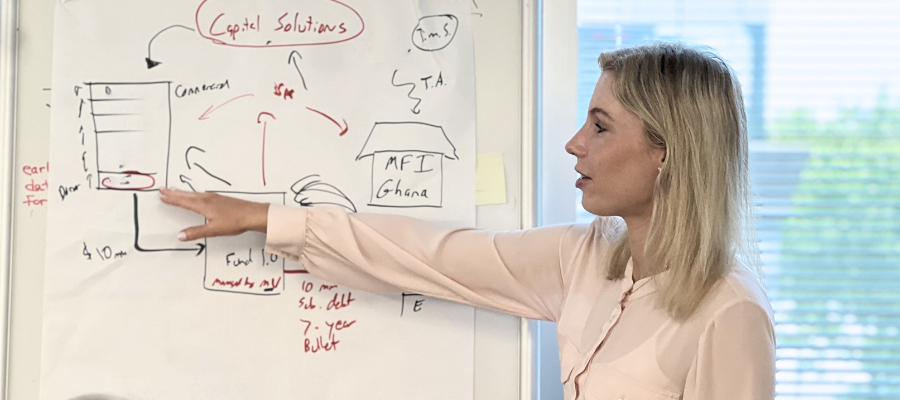What do you do as Director of Finance at DAI Asset Management? Tell us about your role.
As Director of Finance, I oversee all fund accounting and treasury functions at DAI-AM, as well as compliance with financial regulations and the maintenance of internal controls concerning cash requirements and long-term liquidity strategies for all funds. I also supervise annual fund audits for which we engage Grant Thornton, and diligently oversee key relationships with brokers, custodians, and banks, while managing cash activities for all of funds under management.
DAI-AM’s work has far-reaching implications that elevate regions around the world through investments that facilitate financial inclusion. DAI-AM operate funds with investments worldwide and as a result must adhere to a wide variety of regulations.
What is your background and how did you get involved in impact investing?
I’m originally from Poland; I have a master’s degree in finance and accounting from Warsaw School of Economics and began working at McKinsey & Company right after obtaining my master’s degree. While I didn’t know it at a time, my interest in impact investing started when I first traveled to India, which was a truly life-changing experience. While in Gurgaon, I was moved by the stark contrast between the corporate world and the people inhabiting small villages on the streets, going about their daily lives. The experience stirred a strong desire to do something and work in an environment that could uplift communities. Little did I know that just a year later, I would be working at DAI-AM, an opportunity that seemed remarkably serendipitous, as DAI-AM has a sizable exposure to India, and had a mandate of investing to support financial inclusion for underserved entrepreneurs worldwide. It was a perfect coincidence.

You oversee both Fund accounting and Treasury operations at DAI-AM, a role critical in managing our investments, adhering to regulatory standards, and meeting our financial objectives. What distinct challenges and opportunities does overseeing the Finance function at a firm like DAI-AM present?
Fund accounting and treasury functions require a lot of advance planning and consistency, particularly at an asset management firm. We seek to have systematized processes, procedures, and adherence to financial guidelines and regulations, and we have a scrupulous process for reviewing financial statements and work closely with our fund administrators, SEI, and loan administrators, AlterDomus, to provide exceptional service to our investors.
It is important that our stakeholders see the value and meaning in our work and can trust us and rely on the financial information we provide. While doing a good job is essential, effectively marketing our efforts is equally important. Although finance team members are naturally back-office employees, maintaining positive relationships with our investors and responsible financial institutions is paramount to our work.
How do you think the Financial & Accounting role in asset management has evolved in the past five years, especially with advancements in technology and changes in the regulatory landscape?
These days, Chief Financing Officers are increasingly needing to put on a Chief Technology Officer hat. With increased automation also comes increased risks. Fortunately, as DAI-AM is now a part of DAI, we are able to leverage a highly specialized and robust IT team and system. Our corporate accounting systems are also being fully integrated into DAI’s, further streamlining operations and enhancing efficiency. As Heads of Finance and CFOs navigate the ever-evolving technological landscape, we’re finding ourselves increasingly needing to strike the right balance between embracing innovation and ensuring practical, safe, and efficient, implementation.
What advice would you give someone who is interested in getting into asset management finance & accounting?
Top asset management companies are excellent stewards of capital. You can never underestimate having a strong will and a determination to work hard. If you’re driven, enjoy the subject, and are self-motivated, a career in asset management can be truly rewarding. Another characteristic that’s essential to finance and accounting today is the study and understanding of ethics. Today’s accounting exams have separate chapters dedicated to ethics because it is the most important aspect of our work. Adhering to ethical principles not only benefits our investors and partners but also protects our organization’s integrity.
Even though we live in a fast-paced world that will be increasingly dominated by systems and technology, truly understanding the basic principles of accounting, finance, and financial analysis is a skill that will serve you well in the long run. By combining a strong work ethic, a commitment to ethical practices, and a solid grasp of the fundamentals, professionals in finance and accounting can pave the way for a successful and rewarding career.
Disclaimer
The information contained here has been provided by DAI Asset Management, LLC (“DAI-AM”) and no representation or warranty, expressed or implied is made by DAI-AM as to the accuracy or completeness of the information contained herein. Specific portfolio or pipeline companies discussed are for educational purposes only and do not represent all of the portfolio holdings and it should not be assumed that investments in the portfolio or pipeline company identified and discussed were or will be profitable. The companies profiled were selected based on their unique uses of technology in the context of social impact, with no reference to amount of profits or losses, realized or unrealized. The information presented on this page is for informational purposes only and is neither an offer to sell nor a solicitation of an offer to purchase an interest in any DAI-AM product (the “Funds”), and nothing herein should be construed as such. Any such offer or solicitation will be made only by means of delivery of a definitive private offering memorandum which contains a description of the significant risks involved in such an investment. Prospective investors should request a copy of the relevant Memorandum and review all offering materials carefully prior to making an investment.